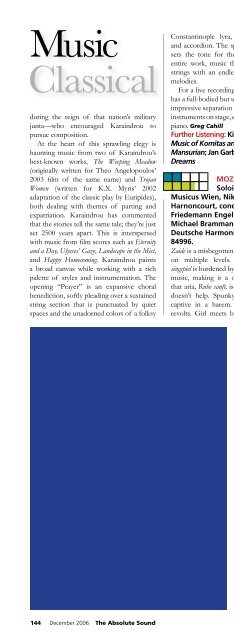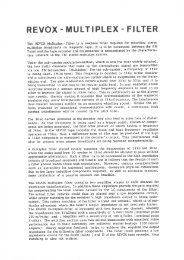Create successful ePaper yourself
Turn your PDF publications into a flip-book with our unique Google optimized e-Paper software.
Music<br />
Classical<br />
during the reign of that nation’s military<br />
junta—who encouraged Karaindrou to<br />
pursue composition.<br />
At the heart of this sprawling elegy is<br />
haunting music from two of Karaindrou’s<br />
best-known works, The Weeping Meadow<br />
(originally written for Theo Angelopoulos’<br />
2003 film of the same name) and Trojan<br />
Women (written for K.X. Myris’ 2002<br />
adaptation of the classic play by Euripides),<br />
both dealing with themes of parting and<br />
expatriation. Karaindrou has commented<br />
that the stories tell the same tale; they’re just<br />
set 2500 years apart. This is interspersed<br />
with music from film scores such as Eternity<br />
and a Day, Ulysses’ Gaze, Landscape in the Mist,<br />
and Happy Homecoming. Karaindrou paints<br />
a broad canvas while working with a rich<br />
palette of styles and instrumentation. The<br />
opening “Prayer” is an expansive choral<br />
benediction, softly pleading over a sustained<br />
string section that is punctuated by quiet<br />
spaces and the unadorned colors of a folksy<br />
Constantinople lyra, French horn, harp,<br />
and accordion. The sparsely arranged track<br />
sets the tone for the melancholia of the<br />
entire work, music that tugs on the heart<br />
strings with an endless array of mournful<br />
melodies.<br />
For a live recording, Elegy of the Uprooting<br />
has a full-bodied but uncluttered sound with<br />
impressive separation of the 110 singers and<br />
instruments on stage, especially Karaindrou’s<br />
piano. Greg Cahill<br />
Further Listening: Kim Kashkashian:<br />
Music of Komitas and Tigran<br />
Mansurian; Jan Garbarek: In Praise of<br />
Dreams<br />
Mozart: Zaide.<br />
Soloists; Concentus<br />
Musicus Wien, Nikolaus<br />
Harnoncourt, conductor.<br />
Friedemann Engelbrecht, producer;<br />
Michael Brammann, engineer.<br />
Deutsche Harmonia Mundi 82876<br />
84996.<br />
Zaide is a misbegotten venture that founders<br />
on multiple levels. Mozart’s unfinished<br />
singspiel is burdened by generic, uninteresting<br />
music, making it a one-aria work though<br />
that aria, Ruhe sanft, is irresistible. The story<br />
doesn’t help. Spunky European girl held<br />
captive in a harem. European slave boy<br />
revolts. Girl meets boy. They fall in love.<br />
Their goal is freedom. Brutal Sultan’s goal<br />
is to behead them. End of story. Mozart<br />
dumped the work, replacing it in 1781<br />
with another “Turkish” opera, the comic<br />
masterpiece Die Entführung aus dem Serail,<br />
whose characters display the humanity<br />
missing in Zaide.<br />
Yet what ultimately sinks this set is the<br />
extended narration written and performed<br />
by Tobias Moretti. Instead of replacing the<br />
now-lost spoken dialogue with a summary<br />
that advances the narrative, Moretti<br />
interprets the drama, supposedly making it<br />
relevant to our times. Smugly pushing his<br />
own slanted political viewpoint, he harangues<br />
the audience rather than enlightening it,<br />
though he does give a good Hitler imitation.<br />
Fortunately, his rants are separately tracked.<br />
Skip them.<br />
If Moretti takes Mozart’s opera fragment<br />
as a blank page for scribbling, Harnoncourt<br />
takes it as a challenge to infuse the music<br />
with life. His overture is an earlier Sinfonia by<br />
Mozart, played with biting strings, buoyant<br />
rhythm, and precise articulation, making you<br />
want to hear more, a hope quickly dashed by<br />
an extended narration and a banal prisoners’<br />
chorus. The vibrant orchestral playing is<br />
full of verve and appetizing detail, a lesson<br />
in making something from nothing. The<br />
singing is on a lesser level, though acceptable.<br />
Diana Damrau is the Zaide, disappointing in<br />
a strained Ruhe sanft but improving later.<br />
Made at concert performances in 2006,<br />
the recording initially places the singers<br />
within the orchestra, lending distance and<br />
a touch of the opaque to Damrau’s Ruhe<br />
sanft. But balances soon improve and there’s<br />
more presence to the sound, which captures<br />
the space and air of Vienna’s Musikverein.<br />
Nevertheless, Mozart would be better served<br />
with a single disc of excerpts instead of this<br />
mess. DD<br />
Further Listening: Mozart: Zaide<br />
arias (Dessay); Mozart: Die<br />
Entführung aus dem Serail (Böhm)<br />
144 December 2006 The Absolute Sound










